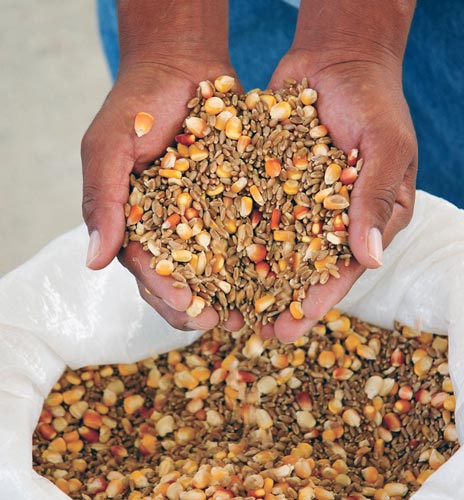CIMMYT, CIBIOGEM and the North Carolina State University (NCSU) transgenics and society group joined together at CIMMYT headquarters on 24 July for the symposium “Transgenics and Society: Towards a constructive dialogue that contributes to policies and regulatory frameworks.” The event was organized to highlight the importance of scientific and moral considerations surrounding individuals’ and hence society’s perspectives about transgenic crops and other emerging technologies.
Secretary for Information and Research Support of CIBIOGEM Dr. Laura Tovar Castillo, welcomed participants on behalf of Dr. Sol Ortiz García, Executive Secretary of CIBIOGEM, and highlighted the importance of this symposium and of achieving constructive dialogue about transgenic technologies. Nearly 1 billion people are suffering from hunger and poverty worldwide, according to the Food and Agriculture Organization (FAO) of the United Nations.

Kevin Pixley, director of the CIMMYT Genetics Resources Program, opened the event with a quote from Megan Clark, CEO of Australia’s Commonwealth Scientific and Industrial Research Organization (CSIRO): “In the next 50 years we will need to produce as much food as has been consumed over our entire human history.”
Climate change, depleted natural resources and overpopulation are just a few of the problems contributing to worldwide food insecurity. Pixley noted that this requires us to make a difference worldwide. “How are we going to help these people survive?” asked CIMMYT director general Tom Lumpkin in his welcome to participants. “CIMMYT is in favor of the technology of genetically modified organisms (GMOs). Though I do say that with words of caution, because we do want to support the developing world with access to this technology, but it is possible to make a bad GMO. I’ve traveled all around the world and seen lax handling of GMOs.”
The discussion was separated into two sessions. CIMMYT staff can view the presentations on InSide CIMMYT. The first session was led by Fred Gould, NCSU professor of entomology and transgenics. Gould’s presentation was titled “The Past, Present and Future of Genetic Engineering Technologies,” and discussed the past marketing of genetically engineered products, new technologies and the possibilities of many new GM technologies. Jennifer Kuzma, co-director of the Genetic Engineering and Society Program at NCSU, finished the first session with a discussion on the governance of genetically engineered organisms and how they are regulated in different countries. “We need to find a middle approach to incorporate values and science in the governance of genetically engineered organisms,” said Kuzma in a wrapup of her presentation.
The second half of the symposium presented the perspective of professionals who have deep ties in Mexican agriculture and also are concerned about the personal and moral issues that influence perceptions about GMOs. Presenters included: Concepción Rodríguez Maciel, associate researcher and professor at the Colegio de Postgraduados; Javier Becerril, professor of economics at the Universidad Autonoma de Yucatán; and Carolina Camacho, principal researcher in the CIMMYT Socioeconomics Program. The theme that ran through these presentations was the need for transgenic crops in Mexico compared with the difficulty of fully explaining the benefits and concerns of transgenic crops to small-scale farmers. Rodríguez Maciel said: “As a country, we have spent way too much time discussing biotechnology issues. It’s time to integrate all the different types of agriculture to face the challenges that climate change will bring. We do need to remember that we are talking to normal human beings and we need to speak their language.”
Jason Delborne, associate professor of science, policy and society at NCSU, rounded out the discussion with his presentation on how to conduct a productive and informative dialogue on transgenic research. He has developed a five-step process that is designed to facilitate a formal discussion regarding transgenic research and ease the general public into a conversation about transgenics that leads to productive action. Building on the foundations of this symposium, CIMMYT hopes to contribute to discussions in Mexico and elsewhere that generate better understanding of the scientific and personal perspectives that societies must acknowledge and address in developing their policies about transgenics (and next generations of technologies).
As highlighted by Jason Delborne, the most important step is often asking and addressing the right question, which in many cases during this symposium participants learned was not actually about transgenics. Instead, the right questions might be about conserving biodiversity, enhancing the ecological sustainability of agricultural practices, preserving the right to save grain for planting next crops, offering technologies that are affordable to resource-poor farmers or about how humankind will produce as much food in the next 50 years as has been consumed over the entire history of humanity.
 Capacity development
Capacity development